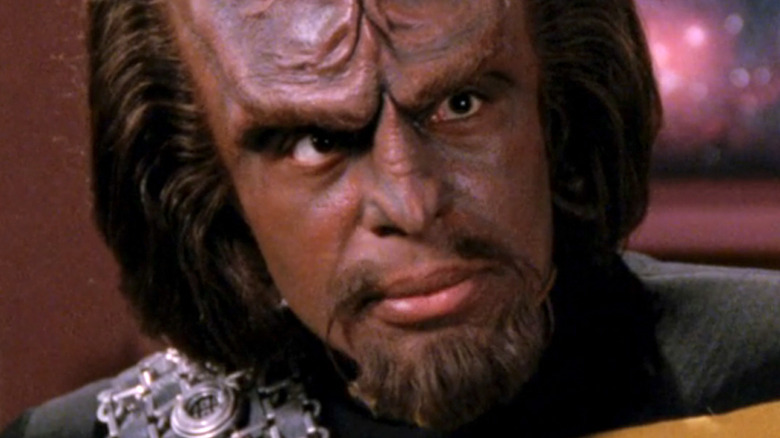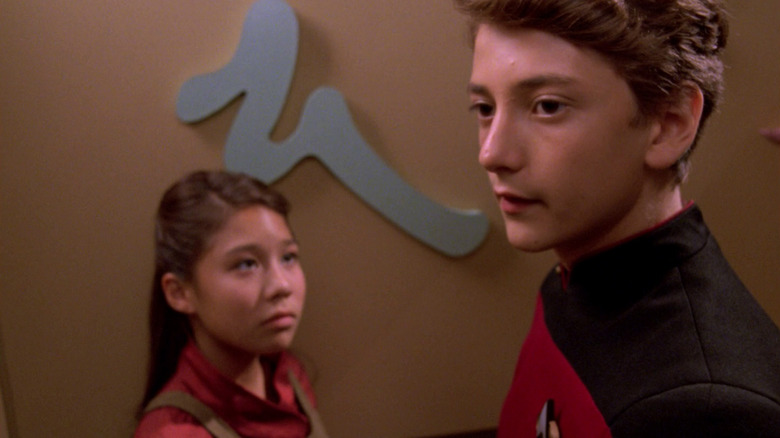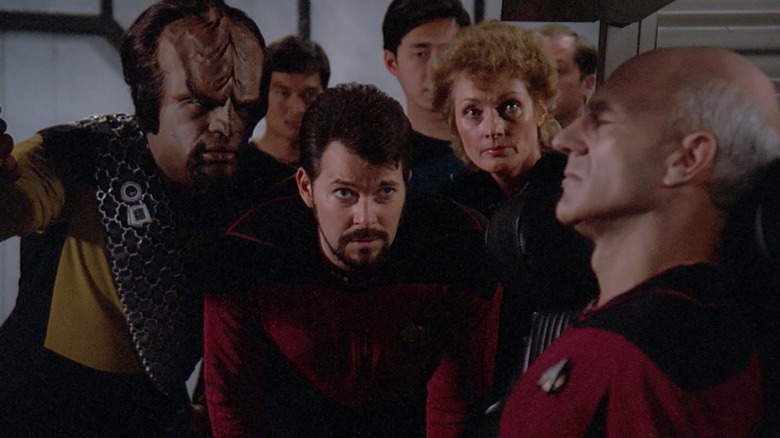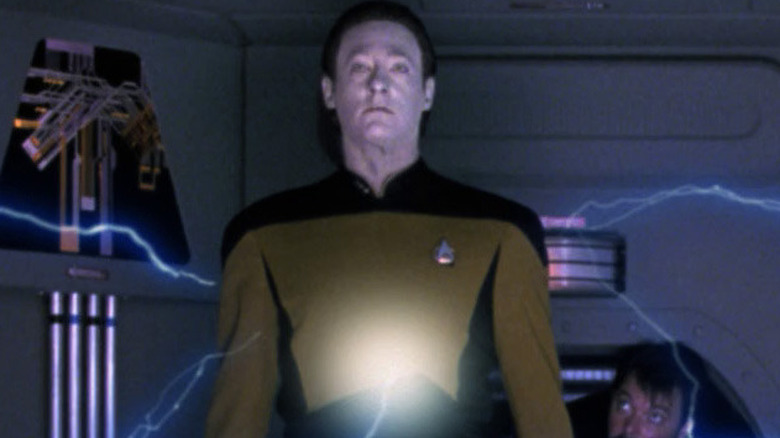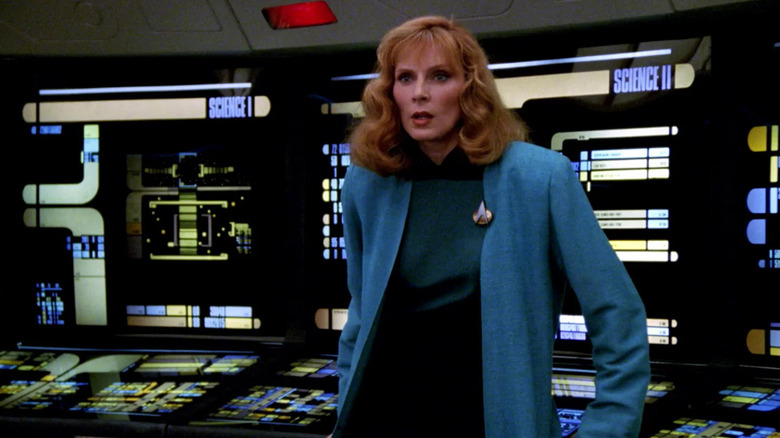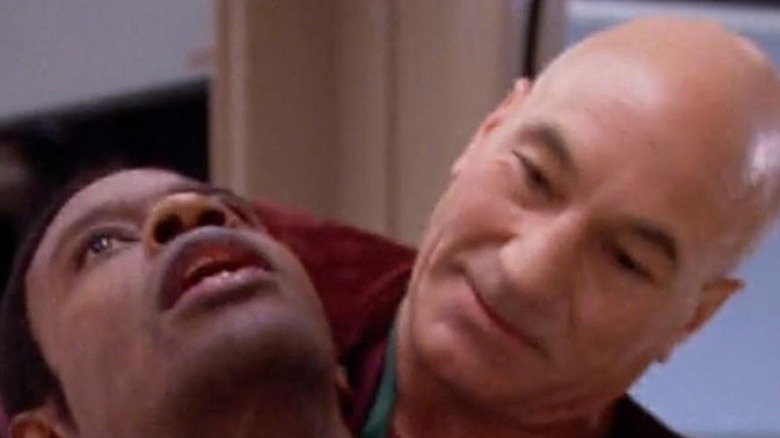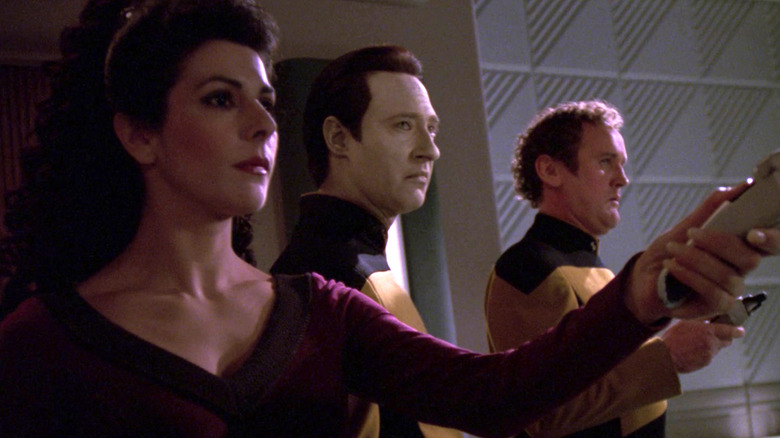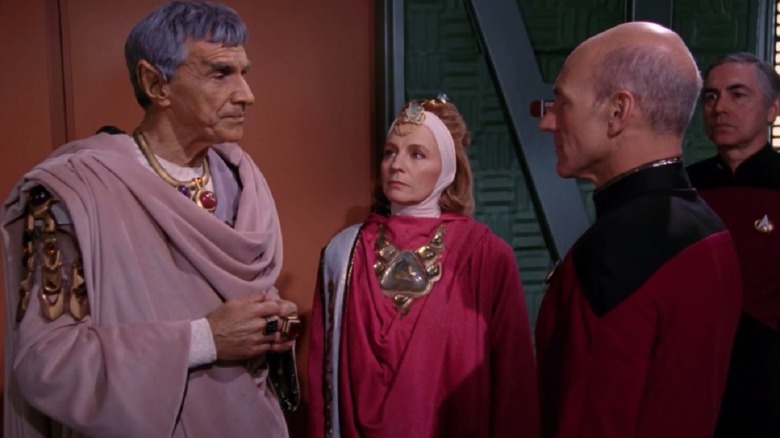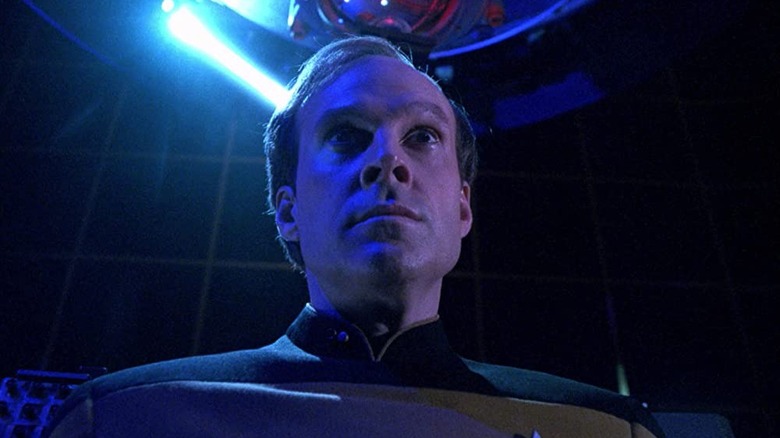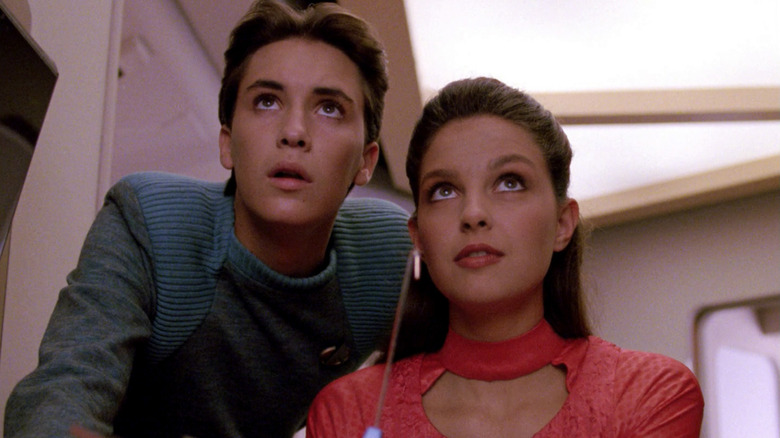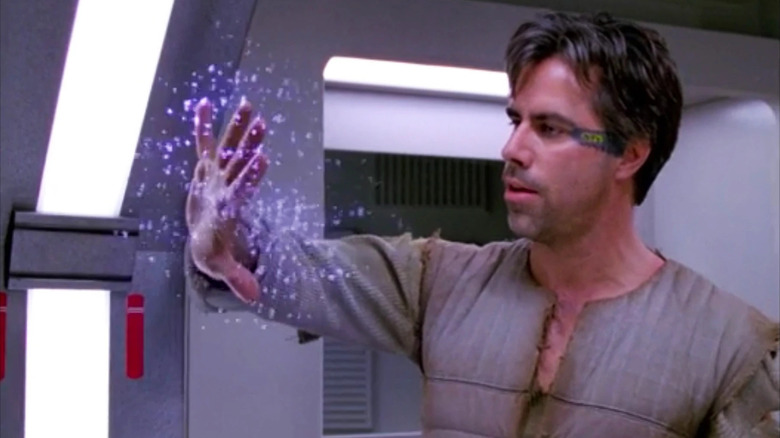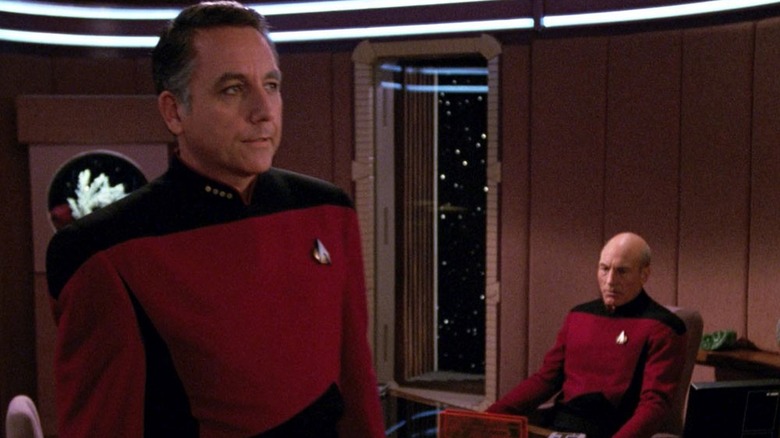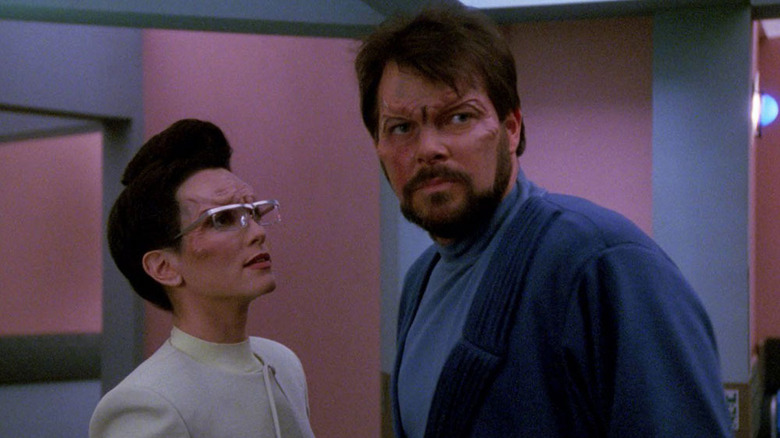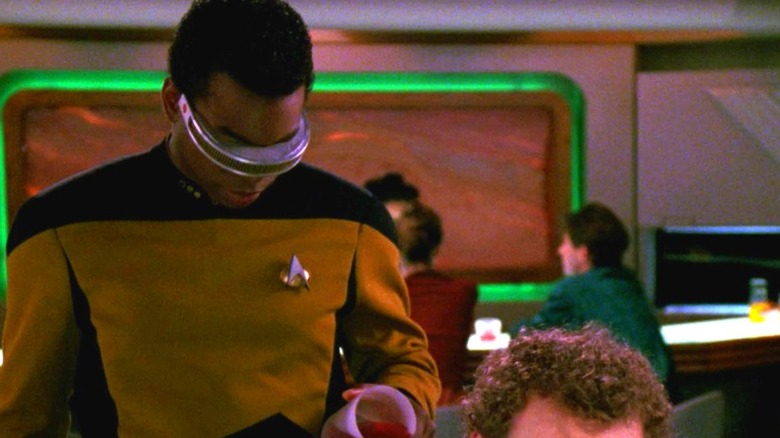The Most Underrated Episodes Of Star Trek: The Next Generation
"Star Trek: The Next Generation" has endured for decades because of its high drama, its strong characters, and its smart stories. Despite the first two seasons being notoriously uneven, "TNG" eventually became a beloved series that still holds up today. It contains some of the best "Star Trek" episodes ever made, from the genre-defining two-parter "Best of Both Worlds" to the multiverse shattering "Yesterday's Enterprise." But, with 178 episodes airing across the show's seven-season run, there are plenty more installments that never get the attention they deserve.
If you were introduced to "Star Trek: The Next Generation" through a recommendation and have only been watching the most highly rated episodes, you're in luck. We've compiled a list of all the hidden-gem episodes that have flown under the radar for years, from deeply political stories to entries inspired by famous action movies. These are the most underrated episodes of "Star Trek: The Next Generation."
Rascals (Season 6, Episode 7)
"Star Trek" has never been afraid to explore different genres, delving into horror, romance, and even the occasional Western. There have even been plenty of comedic episodes, many of which are hugely underrated. One of the best in "The Next Generation" is the Season 6 episode "Rascals," a story that's always been divisive. Many have knocked it for being preposterous and overly silly, but there's no denying it delivers good, clean fun and gives new insight into several secondary characters.
The episode begins with Picard, Ensign Ro, Guinan, and Keiko O'Brien being turned into children through a transporter accident. While Dr. Crusher works on a way to change them back, Picard struggles with the idea of having his life stripped away from him. Ro's experience brings back memories of a childhood lost on war-torn Bajor, and Keiko worries her marriage to Miles may be over. When a group of Ferengi pirates takes over the ship, it's up to the teenage Picard and a team of children to fight back.
Sure, the plot is ridiculous, but somehow "Rascals" makes it work by just being so much goofy fun, and the cast of child actors is surprisingly good as younger versions of our four favorites. Those who like their "Star Trek" more dramatic have never been fond of "Rascals," but for those who enjoy the franchise's humor, it's a winner and definitely deserves more love than it gets from critics.
Time Squared (Season 2, Episode 13)
The first two seasons of "Star Trek: The Next Generation" are among the worst of the entire "Star Trek" franchise, but even within those first two rocky years there are a handful of standouts, mostly within the series' sophomore year. "The Measure of a Man" is rightfully considered to be among the best "Star Trek: The Next Generation" episodes ever produced, for example. One of the most underrated "TNG" installments also comes from Season 2, the intriguing mystery story "Time Squared."
In classic "Star Trek" fashion there is no villain, only a puzzling problem to solve, with the Enterprise discovering a stray Federation shuttlecraft. Upon bringing it aboard, the crew are surprised to find its pilot is none other than Captain Picard, time shifted from six hours into the future. To complicate matters, he's been rendered mute from the passage backwards in time. With two Picards on board, it's a race against time to stop whatever is going to happen to the Enterprise and figure out why the captain was the only one left alive.
This is one of the first episodes to show a more vulnerable side to the normally strong and confident Picard. The captain begins to question his own decisions with the presence of his future self. Though rarely mentioned on any best-of lists, "Time Squared" might be one of the strongest true mysteries in "Star Trek" history.
Disaster (Season 5, Episode 5)
"Star Trek: The Next Generation" was always more of a character-driven series. Many of its best episodes boasted stories that served as mere frameworks to hang compelling character drama on, with the audience's deep investment in the relationships between Riker, Troi, Geordi, and Data being the reason they came back week after week. Never was this more evident than in "Disaster," one of the show's best ensemble episodes.
The drama breaks when the ship is struck by a mysterious phenomenon that disables the Enterprise's critical systems and cuts off power and communication throughout the ship. With Picard trapped in a turbolift with a group of school children and gravely wounded, Troi is left in command on the bridge, unsure how to proceed. Riker and Data attempt to regain control of the ship while in between decks, and Geordi and Crusher struggle to stay alive in the cargo bay, where a radiation leak threatens to slowly poison them. Meanwhile, in Ten Forward, the normally stoic warrior Worf is forced to play midwife as Keiko O'Brien goes into labor.
Though the stakes may not be galactic, the tension is real and the problem-solving is clever and satisfying. Seeing characters like Picard, Worf, and Troi unexpectedly thrust into unfamiliar situations also helps shake things up, giving audiences a new glimpse into their characters. It gives everyone something to do, even several of the lesser-seen recurring characters.
Remember Me (Season 4, Episode 5)
For a series with a strong ensemble cast, it's surprising that Gates McFadden's Dr. Beverly Crusher didn't front more episodes. The installments that do feature her prominently are usually focused on a love affair with a guest star. One Crusher episode even became one of the most reviled "Star Trek" episodes ever. However, the character is actually the focus of one of the most underrated episodes of all time in "TNG" Season 4's "Remember Me," an entry that has been criminally overlooked by fans.
Upon visiting a starbase, Crusher reconnects with former mentor Dr. Dalen Quaice, who soon goes missing. The problem is, nobody seems to remember him, and computer records say he never existed. The puzzle doesn't stop there, as more crew members begin to be erased from existence, and only Crusher seems to know that anyone is actually missing. Her quest to get to the bottom of the mystery is made more difficult by the fact that everyone thinks she's lost her mind. As Crusher gets closer to the truth, she fears that there may be nobody left to save by the time she solves the riddle of their disappearances.
A terrifying episode with a thought-provoking story and a clever twist, "Remember Me" is "TNG" at its best, combining edge-of-your-seat suspense with engaging character work. It also illustrates just how underused McFadden really was throughout the show's run.
Starship Mine (Season 6, Episode 18)
The original "Star Trek" series is famed for its gung-ho captain, James T. Kirk, who would lock horns with various aliens week after week. Though "Star Trek: The Next Generation" is known for more cerebral, less action-oriented stories, series star Patrick Stewart did take the gloves off from time to time. Most fans sing the praises of the gritty Season 3 episode "Captain's Holiday," but the Season 5 entry "Starship Mine" deserves just as much attention.
With the Enterprise undergoing maintenance that requires a sweep of deadly radiation at an orbital station, the crew is offloaded for a formal reception on the planet below. But just as Picard is about to be the last to leave, he spots a few suspicious technicians and realizes they're about to be hoodwinked by a group of sinister thieves. Alone and trapped aboard the ship, and with no way to get help from his crew, Picard may have to become a cold-blooded killer if he's going to stop them from making off with a dangerous chemical weapon, all while trying to escape before the radiation sweep kills them all. At the same time, his crew must deal with the thieves' accomplices down on the planet's surface, who hold them hostage when their plan is exposed.
Described as "'Die Hard' on the Enterprise" by writer Morgan Gendel, the episode shows that Picard can be a heroic man of action, even if he's usually more comfortable in his ready room. But, more than just a send-up of a popular action movie, "Starship Mine" is a satisfying, nail-biting thriller right up until the very end.
Power Play (Season 5, Episode 15)
Plenty of "Star Trek" episodes have seen hostile villains taking over the ship and crew, whether it be Harry Mudd in "TOS" or the Dominion overtaking the station in "DS9." But a different kind of takeover happens in one of the most underrated "TNG" episodes, Season 5's "Power Play." A unique episode that gives a few series regulars new characters to play, it's about an apparent coup aboard the Enterprise, which Picard is powerless to stop.
Answering a distress call, the Enterprise crew arrives at a faraway moon and learns it was sent from the USS Essex, an early Federation starship that was lost more than 200 years before. As Picard orders the ship to begin a search for the ship's wreckage, Data, Troi, and Chief O'Brien mount a daring takeover of the Enterprise. The three officers tell Picard that they are actually the spirits of the Essex's crew. They order him to recover their physical remains and return them to Earth for burial while threatening to kill hostages in 10 Forward if he doesn't comply. As Riker, Geordi, and Ro devise a plan to stop them, Picard questions if their story is true.
With a hostage crisis, a Starfleet mystery, sci-fi body swaps, and a gripping climax, "Power Play" has it all, and yet it is never mentioned alongside the series' best episodes. However, as one of the show's most engaging episodes — one that also gives recurring stars Colm Meaney and Michelle Forbes some fun material — it certainly deserves to be.
Sarek (Season 3, Episode 23)
"Star Trek" crossovers usually go down well with fans, with episodes featuring Spock and Scotty in "The Next Generation" among the highest rated in the series. Before they met either of those "The Original Series" stalwarts, the Enterprise crew were visited by another classic "Star Trek" icon in a Season 3 episode that is often overlooked. Perhaps because it came on the heels of the classic cliffhanger "The Best of Both Worlds," the episode "Sarek" is easily one of the most underrated of that season.
Famed "Star Trek" guest star Mark Lenard returns to the franchise to reprise the role of Spock's father Sarek, who had appeared in both "The Original Series" and several movies. Sarek arrives on the Enterprise to negotiate what is to be his final treaty as a Federation ambassador, as he is due to retire shortly thereafter. Upon his arrival, the crew begins to exhibit strange and violent emotional outbursts, which are soon traced back to the aging Vulcan, who they discover is suffering from a rare degenerative disorder and is in denial about his condition.
A statement on aging and the social stigma of disease, "Sarek" is a powerful allegory that gives Mark Lenard and Patrick Stewart some of their best material. While most fans of "The Next Generation" will point to "Yesterday's Enterprise" and "The Offspring" as the show's early highlights, "Sarek" is a great watch and shouldn't be forgotten.
The Nth Degree (Season 4, Episode 19)
Known for more than just its charming main cast, "Star Trek: The Next Generation" also holds appeal for its fan-favorite recurring characters, such as Ro Laren, Miles O'Brien, and bartender Guinan. The standout that audiences arguably connect with the most is Lt. Reginald Barclay (Dwight Schultz), a Starfleet officer who suffers from severe social anxiety. While Barclay's first appearance in "Hollow Pursuits" is often cited as a landmark episode for presenting a neurodivergent character, the Season 4 episode "The Nth Degree" is just as impactful, yet it never gets the same amount of attention.
The "Star Trek" version of "Flowers for Algernon," Barclay is struck by a beam of energy from an alien artifact in the opening sequence, knocking him unconscious. When he is revived, he is a new man: Barclay is now confident, assertive, and vastly more intelligent. When a crisis strikes the ship, it's Barclay who saves the day, but in doing so, he becomes tied to the ship's computer system and begins to assume control of its operations. Determined to prove what he can do with his new abilities, Barclay sends the Enterprise on a trip to the center of the galaxy.
Influenced by a famous novel and playing off classic "Star Trek" tropes, "The Nth Degree" uses Barclay to tell a fascinating new story. The experience helps him come to terms with his special nature, pushing the character's unique story forward in big and meaningful ways. Schultz is fantastic in this episode, delivering his best and most nuanced performance.
The Game (Season 5, Episode 6)
Wesley Crusher has been a controversial character in "Star Trek" history for years, even while Wil Wheaton, the actor who plays him, has gone on to become a pop culture icon. It doesn't help that Wesley's early episodes take place during the show's first, troubled season. He left in Season 4, but the character returned for a pair of episodes in Season 5. While "The First Duty" is popular for its powerful moral message — not to mention one of Captain Picard's best speeches — his earlier comeback in "The Game" has long been overlooked as mere fluff.
In the episode, Riker returns from a trip to the pleasure planet of Risa and brings back a game that he shares with his shipmates. Unbeknownst to the crew, the game is both addictive and mind-altering, putting them under the spell of an alien enemy who wants to take over the Federation. While most of the crew become addicted, Wesley manages to avoid it thanks to his budding romance with Ensign Robin Lefler (a young Ashley Judd in her first role). The two young officers are left to save the ship from an alien takeover, all while the crew attempts to force them to submit to the game's mind control.
Though there's no deep message here (other than the insidiousness of addiction, perhaps), but "The Game" is still an effective action thriller along the lines of "Invasion of the Body Snatchers."
The Hunted (Season 3, Episode 11)
"Star Trek: The Next Generation" is known for its social commentary, posing moral questions that test the crew and force viewers into thinking about serious issues. Episodes like "Darmok," "I, Borg," and "The Defector" delve into how we view those who are different, and they all rank among the highest rated in the series. But another installment, the Season 3 episode "The Hunted," should also be appreciated for tackling some serious subject matter head-on.
Visiting the peaceful planet of Angosia, whose people have recently applied for Federation membership, Picard and the Enterprise assist the Prime Minister when a dangerous criminal escapes from a lunar penal colony. Aboard the ship, Troi and Data learn that the prisoner, Roga Danar, is a veteran of the Angosian military and a war hero. It seems the Angosians used genetic modification to augment their soldiers, turning them into effective killing machines, but when the wars ended, the augmentations couldn't be reversed, and the soldiers became outcasts. Unable to reintegrate into society, the Angosian veterans were forced into a prison on one of the planet's moons, and now seek their freedom.
How society treats its struggling military veterans after returning home from war has been an important political issue for decades, and it's one that "The Next Generation" uses science fiction to confront in "The Hunted." The subject matter examined here is important and the episode definitely deserves wider appreciation.
The Wounded (Season 4, Episode 12)
Season 4's "The Wounded" is another episode that explores the horrors of war and how it takes a toll on those who live through it. It's also an important story that really digs into the history of recurring character Miles O'Brien — we learn that he is a veteran of a long war.
It's only been a year since the Federation's war with the Cardassians, an alien race that makes its debut in this episode. The war has taken a toll on many of those who served, and it weighs heavy on starship captain Benjamin Maxwell, who has seemingly gone rogue and started hunting down Cardassian ships in a recently created demilitarized zone. Picard and the Enterprise escort a group of Cardassian observers into the zone to locate Maxwell and bring him in. When they find him, Maxwell doesn't surrender easily, instead making stunning accusations about the Cardassians and their intentions.
Though often remembered for featuring Bob Gunton (best known for playing Warden Norton in "The Shawshank Redemption") as Maxwell, and for the first appearance of the Cardassians (who would become the recurring antagonists on sister series "Deep Space Nine"), the episode is rarely noted for just how good it really is. We learn that O'Brien is a war veteran who is still haunted by his service, and that he harbors prejudice against his former enemies, a story that would wind its way through years of further stories on "DS9."
First Contact (Season 4, Episode 15)
Not to be confused with the 1996 movie of the same name, "First Contact" is a "Star Trek: The Next Generation" episode that sees the crew struggling with a classic Prime Directive dilemma on a visit to a pre-warp civilization. Many of the franchise's best episodes center on such problems, with "A Private Little War," "Blink of an Eye," and "Who Watches the Watchers" the most well-known examples. If you love those celebrated episodes, then "First Contact" should be next on your watch list.
On the verge of discovering warp technology, the planet Malcor III is being prepared for first contact by the Federation. The Enterprise's mission is derailed when Riker, who is undercover posing as a local, is injured and the people on the surface realize there are aliens among them. As a panic threatens to break out, the government becomes split between the more progressive leadership of Chancellor Durkin and his chief science advisor Mirasta Yale, and the more conservative hardliners like Minister of Security Krola, who wants to declare war. As their schism complicates first contact, Picard must find a way to rescue Riker while convincing the Malcorians that they have no hostile intentions.
An overtly political episode, it's a rare story told almost entirely from the perspective of the alien guest stars, with much of the episode not involving Picard and his crew at all. Throw in a guest appearance from "Cheers" star Bebe Neuwirth, and "First Contact" becomes an underrated classic.
The Mind's Eye (Season 4, Episode 25)
A shocking twist in the "Star Trek: The Next Generation" Season 4 finale "Redemption, Part 1" saw the first real appearance of the Romulan Commander Sela, the daughter of an alternate reality version of crew member Tasha Yar. However, often overlooked is Sela's role in the earlier episode "The Mind's Eye." Though Sela is never actually seen here, remaining in the shadows, she teases her upcoming debut with a hint at what's to come.
Essentially a sci-fi remake of "The Manchurian Candidate," the episode begins with Geordi La Forge leaving the Enterprise for some much-needed shore leave on the pleasure planet Risa. Before he can get there, he's kidnapped by Romulans and subjected to a brutal form of torture and brainwashing. When he's deposited back on the Enterprise, a visiting Klingon — in league with the Romulans — uses a handheld device to manipulate Geordi's visor, sending him subliminal instructions to assassinate the Governor of a Klingon colony.
As effective an episode of "Star Trek" as the "Manchurian Candidate" is a film, "The Mind's Eye" continues the ongoing story arc that saw factions of Klingons and Romulans working together to destabilize the Federation. A taut thriller from start to finish, it's anyone's guess why nobody ever talks about how great this episode truly is.
